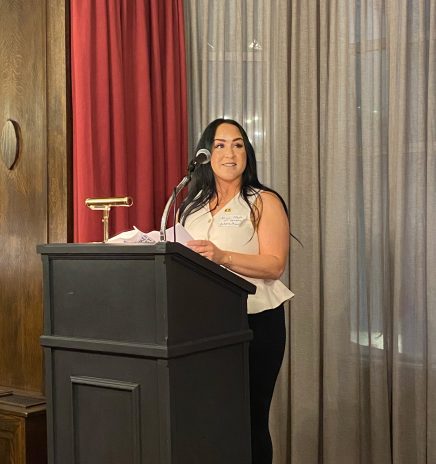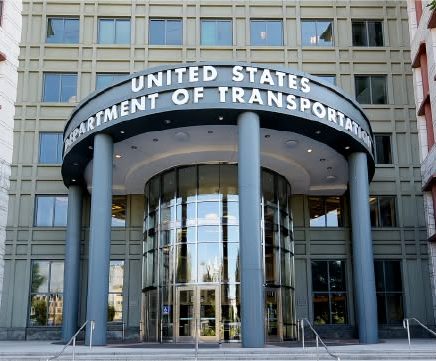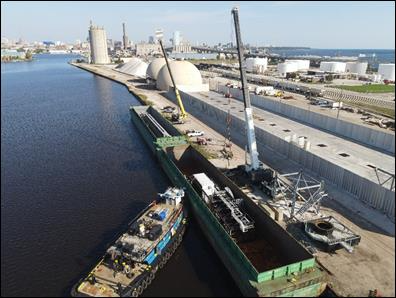Port Milwaukee Director Looks Forward to New Role

Port Milwaukee Director Adam Tindall-Schlicht believes the Great Lakes is ripe for an export revival, and he will be taking those views to an important new forum. Tindall-Schlicht was recently appointed to the Maritime Transportation System National Advisory Committee by U.S. Transportation Secretary Pete Buttigieg.
The MTSNAC, a chartered advisory committee, advises the secretary of transportation, through the U.S. Maritime Administration, on ways to identify and address impediments hindering the effective use of maritime transportation. Tindall-Schlicht also revealed that he has been asked by Buttigieg to serve as co-chair for a port subcommittee within MTSNAC.
Tindall-Schlicht will join 22 other luminaries in maritime transportation and logistics, such as Roger Guenther, Port Houston executive director, and leaders from sectors including commercial transportation firms, state and local public entities, trade associations, labor organizations, academic and environmental groups.
“Our maritime industry plays a central role in our supply chains and our economic strength as a nation,” Buttigieg said. “These new members will help us deliver the maritime investments in the Bipartisan Infrastructure Law, fighting inflation and reducing delays for the American people.”
In addition to this new role, Tindall-Schlicht serves as a commissioner on the Southeastern Wisconsin Regional Planning Commission and on the Great Lakes Protection Fund. He was appointed to both positions by Wisconsin Gov. Tony Evers. Tindall-Schlicht is also president of the Wisconsin Commercial Ports Association.
The MTSNAC does not exercise program management responsibilities and makes no decisions directly affecting the programs on which it provides advice. Its recommendation are non-binding. Decisions directly affecting implementation of maritime policy will remain with the Maritime Administrator and the Department of Transportation.
Key Time For MTSNAC
Tindall-Schlicht will serve on the MTSNAC at a time when addressing supply chains and moving goods to market has never been more important.
“I am proud to serve on this federal advisory committee and share Port Milwaukee’s best practices to inform maritime operations across the nation,” Tindall-Schlicht said. “I began my Great Lakes career at the U.S. Department of Transportation, which is why this appointment is so important to me. From addressing supply chain challenges to recovering from the pandemic, this is a critical time in our country, and I’m eager to get to work.”
He adds, “Our customers and stevedores are hungry for more work. We see our Great Lakes transportation system as a relief valve for supply chain systems elsewhere that are congested and overstressed.”
Tindall-Schlicht said he expects to learn a lot about system-wide issues from serving on MTSNAC, including climate change, cyber-security and port digitalization efforts. The Coast Guard is currently developing new cyber rules for ports that could be rolled out before the end of 2022.
Tindall-Schlicht draws attention to Port Milwaukee’s green-incentive program, StewardSHIP, that offers domestic and foreign-flag vessels that have documented emissions-reduction measures a 10 percent dockage discount for each port transit within a single shipping season. “This will benefit Milwaukee’s harbor by reducing greenhouse gas emissions, deploying clean energy solutions and supporting climate adaptation activities at the port,” according to the port’s website.
Pivot To Ag Commodities
Tindall-Schlicht points out that coal has virtually disappeared as a cargo on the Great Lakes, representing 750,000 tons of cargo a year that had to be replaced at Port Milwaukee alone. Besides coal, traditional Great Lakes bulk product cargoes include iron ore from the Minnesota Range, steel, aggregate, cement, fertilizer, salt and ag products. “One of our jobs as a port is to ensure that those industries stay solvent,” he said.
Agriculture products have a lot of room for expansion on the Great Lakes. Port Milwaukee has made a big bet on that future with the groundbreaking last November of its $35 million agricultural maritime export facility in collaboration with The Delong Co., Inc.
The new facility, located on the west side of Jones Island, will be one of the first on the Great Lakes-St. Lawrence Seaway system to handle agricultural commodities via truck, rail and international vessel. Cargoes include Dried Distillers Grains with Solubles (DDGs), a high-nutrition animal feed supplement derived as a byproduct of ethanol manufacturing. It will be the first such facility anywhere on the Great Lakes system.
The facility will open Wisconsin’s maritime and agricultural economies to new international markets for this and other products. Future service at the facility will include the export of Wisconsin-grown soybeans, corn and grain. Port Milwaukee was one of the first nationwide grant recipients of the Port Infrastructure Development Program through the U.S. Department of Transportation. Additional facility funding was provided by the Wisconsin Department of Transportation, Port Milwaukee and The DeLong Co., Inc.
“Every cent counts on a per-ton basis for cargo flows,” Tindall-Schlicht said, and he believes Great Lakes routes are becoming increasingly competitive.
The project could not be more timely, as agriculture supply chains are reorienting due to many factors. These include not just Russia’s invasion of Ukraine and the recovery from the COVID-19 lockdowns, but new logistics disruptions due to California’s controversial AB5 laws requiring truckers to be treated as full employees with benefits rather than independent contractors. Trucking companies have warned that the regulations will force 70,000 truckers off California’s roads, and dockworkers at Oakland have joined the protests, causing ocean vessels to bypass the port of Oakland altogether.
It’s not known how all these difficulties will shake out, but they surely offer opportunity for the Great Lakes system to open and develop new paths for cargoes. Tindall-Schlicht notes that a couple of years ago, Great Lakes governors jointly called for doubling Great Lakes trade. Speaking of the Jones Island facility, Bo DeLong, vice president of grain at The DeLong Company, said, “Once completed, this project will offer Wisconsin agriculture the ability to reach new markets with a better logistical model.”

Alicia Nash Receives IMPACT! 2026 Award
Alicia Nash, vice president of operations at Ontario Shipyards, has been named the recipient of the Great Lakes/ Seaway Review’s IMPACT! 2026 Award. The IMPACT! Award recognizes outstanding women in shipping whose leadership, vision and... Read More

Stephen M. Carmel Named MARAD Administrator
The U.S. Department of Transportation has announced that Stephen M. Carmel has been confirmed as the 21st administrator of the Maritime Administration (MARAD) after the U.S. Senate confirmed the nomination... Read More



